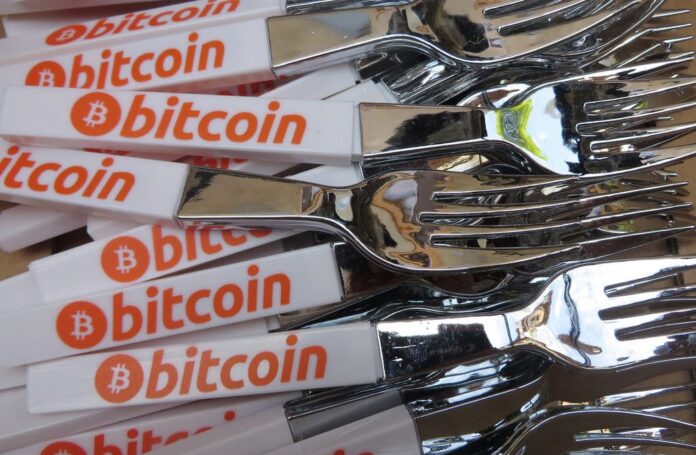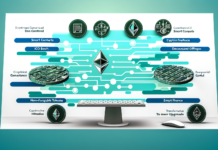Challenge Accepted: Will Forks Ruin Bitcoin?
If you’re relatively new to the cryptocurrency space, you might have scratched your head at the term “fork”. Since August this year, much of the discourse surrounding Bitcoin has been about so-called forks, so it’s important to understand what we mean by them.
What is a fork?
For the purposes of this article, when we refer to a fork, we mean a “hard fork”. There is another type of rule change that doesn’t result in two chains, and these are known as “soft forks”.
A soft fork is any change to the Bitcoin network that results in a new instance of the blockchain running in tandem with the original chain. They occur frequently thanks to the network’s distributed consensus feature. If two miners find a block simultaneously, the network forks. However, one of these chains will not make it, as only one will have subsequent blocks added to it. These “accidental” forks are nothing to be concerned about, and are part of the very design of Bitcoin and other blockchains.
The other type of fork is one introduced deliberately. These seek to change the rules about what is considered a valid transaction – perhaps a group of miners want to see more space in each block, or to introduce some form of second layer protocol. Either way, once miners begin to mine blocks using the different ruleset, the fork will occur and if both chains (rulesets) are mined, a new instance of the chain will continue.
When a deliberate fork occurs, a snapshot of the blockchain is taken and all transactions prior to the fork will appear on both chains. However, going forward, only transactions abiding by the rules of either chain will be permitted.
Such forks have become popular because the newly created chain can provide a sort of dividend on existing holdings. For every successful coin split fork, those who held the cryptocurrency in question at the time of the split will be given an equal number of the new coins. For example, at the time of the Bitcoin Cash (BCH) fork in August 2017, those holding Bitcoin (BTC) on August 1st received the same number of BCH as they held BTC. If investors deem the new fork to be worth anything, then holders are essentially gifted additional funds.
Existing Bitcoin Forks
There have been several Bitcoin hard forks over the years and these have had varying degrees of success.
Bitcoin XT was the first major effort at a coin splitting hard fork. It aimed to increase the block size on the network to 8MB. This would allow more transactions per second. However, as it didn’t reach the 75% consensus that developers Gavin Andresen and Mike Hearn were looking for, the project was largely abandoned.
Bitcoin Cash appears to be doing much better than XT. Again, its goal was to increase the block size on the chain. It was implemented because of resistance to SegWit, a second layer scaling proposal soft forked into the original chain in August 2017. It was spearheaded by Bitcoin proponent Roger Ver and influential miner ViaBTC. At the time of writing, each Bitcoin Cash is worth $1,499. This means that if you had held Bitcoin on August 1st, 2017, you’d have been given an equal number of BCH which are now worth over 10% of the price of the original coins. This success has opened the flood gates, and many are trying to emulate it.
Following shortly behind Bitcoin Cash was Bitcoin Gold. The developers behind this hard fork wanted to return to the good old days where anyone with a computer could mine the chain. To achieve this, they sought to exclude the controversial ASIC mining units which are prohibitively expensive to buy and run. Each Bitcoin Gold currently trades at around $280 and is on a rather steady downtrend, presumably as more people learn the steps required to sell it off.
Since some of these forks have yielded dividends to holders, there are now a slew of other forks coming soon. These include Bitcoin Diamond, Super Bitcoin, Bitcoin Silver, Bitcoin Platinum, and Bitcoin Uranium. Each of these proposals to fork the original Bitcoin chain seek to change some rule of the network.
How they affect bitcoin price and reputation
The first major fork, Bitcoin Cash, had a huge affect on the price of Bitcoin. There was a lot of fear and uncertainty in the space surrounding a coin split fork, as one had never properly occurred before – certainly not with billions of dollars on the line. However, since the price rebounded quickly, the Bitcoin Gold fork had a negligible effect on the price and reputation of Bitcoin. It seems that the community is largely ignoring contentious hard forks and are considering them for what they are – an excuse to further cash in. It’s likely that, just as the “ICO fever” of the summer months has calmed down considerably, so too will people’s interest in these cash grab efforts by competing groups of developers.
By Julia Beyers, who is a freelance journalist and independent contributor, specializing in cryptocurrencies and related trends. She has an extensive experience in writing about bitcoin usage, statistics and predictions of various experts.















